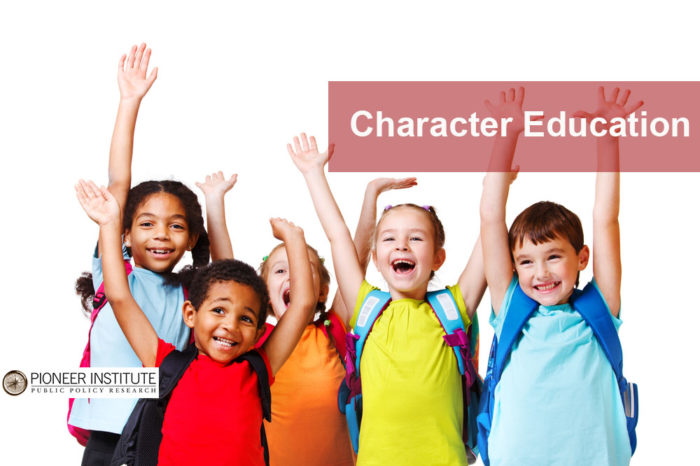Study: Character Education in Mass. Charter Public Schools Improving Academic Results, Social Behavior
Two local case studies demonstrate benefits, but many programs also fall short.
BOSTON – At a time when the priorities in K-12 education have skewed towards STEM courses and academic achievement scores, two new papers from Pioneer Institute highlight how teaching character education in schools can benefit students even beyond the classroom, but can be challenging to implement effectively.
In Massachusetts Charter Public Schools: Best Practices in Character Education, author and Pioneer Senior Education Fellow Cara Stillings Candal looks at two high performing Massachusetts charter public schools—Abby Kelley Foster Charter School in Worcester, MA and the Brooke Charter School Network of Boston, MA—and how they approach character education. Her study is part of a series of papers from Pioneer highlighting best practices in the charter sector.
“Over fifty years ago, the Rev. Dr. Martin Luther King’s dream was that Americans would judge one another by the ‘content of their character,’” said Jamie Gass, the director of the Center for School Reform at Pioneer Institute. “These research papers highlight successful models of character education in K-12 schooling, as well as a clear cautionary message – we have miles to go in educating schoolchildren towards King’s ideal.”
Candal says that the strong character education programs at both charter schools have contributed to improved academic results, increases in pro-social behavior and decreases in suspension rates. The charter schools also say their students are developing important “non-cognitive skills,” such as self-control and self-discipline. These are characteristics that research associates with effective character education programs.
Candal draws from observations, interviews, and analyses of school documents and student data to describe how the two schools attempt to strike a balance between educating for “moral character” and for “performance character.”
Charter schools and character education are closely aligned. Candal notes that many charter schools in Massachusetts and elsewhere distinguish themselves based on a specific approach to character education. Additionally charter schools such as KIPP and other “no excuses” charters are known for teaching “performance character.” Finally, many charter schools include a plan for how they will form people of character as a central part of their founding application.
The two schools can be valuable models for other schools—charter and traditional public alike—hoping to rethink or simply refresh how they educate for character. Recommendations include:
- Aligning character initiatives to the needs of the school community
- Integrating character education as part of the school experience
- Making character development a community endeavor
- Investing in teachers as part of a commitment to character education
- Viewing character development and discipline structures as interrelated
In a second paper, The Inevitability of Character Education, Dr. Kevin Ryan says that though educators have tried for more than 30 years to infuse character education in public schools, a recent report from the U.S. Department of Education found that seven of the nation’s most widely used character education programs failed to do what they said they would do.
But Ryan, the founder and director emeritus of the Center for Character and Social Responsibility (CCSR) at the Boston University School of Education, says one reason for the disappointing results is that the focus of front-line educators has been directed to only improving academic achievement scores in areas such as mathematics, science, and English language arts. “The fledgling character education movement was pushed back into the shadows,” says Ryan.
Ryan also says the character education programs were ineffective because there is no longer a clear understanding of what character is. Consequently, it can be difficult for a school system or an individual teacher to determine how to intervene in the life of a student. Educators either decided not to engage in character education or they tried to implement character education programs with no real understanding of their psychological or philosophical basis.
Since intervening in the lives of children to make a positive difference is the essential job of educators, Ryan proposes six activities that appear to be effective in bringing about that positive difference. The actions are represented by six “E-words”:
- Example – Teachers are de facto models for their students.
- Explanation – To enhance students’ understanding of the human condition and our history, teachers need to understand virtues and vices and explain them to students.
- Exhortation – By inspiring students to want to become better, teachers can promote moral growth.
- Ethos – Schools with a positive ethos affect the characters of their students.
- Expectations of Excellence – Older students and adults admire teachers they once had who would not accept work that wasn’t their best. Their character was enhanced by a desire to reach for excellence.
- Engagement – To enrich the character of students, teachers should support them as they embrace their personal transformation.
Cara Stillings Candal is an education researcher and writer. She is a senior consultant for research and curriculum at the Center for Better Schools/National Academy for Advanced Teacher Education, an adjunct professor at the Boston University School of Education, and a senior fellow at Pioneer Institute.
Dr. Kevin Ryan is the founder and director emeritus of the Center for Character and Social Responsibility (CCSR) at Boston University. He is a former high school English teacher and has taught on the faculties of Stanford University, the University of Chicago, Harvard University, Ohio State University and the University of Lisbon. In 2003, Dr. Ryan received the honor of being appointed to the Pontifical Academy for the Social Sciences by Pope John Paul II.
###
Pioneer Institute is an independent, non-partisan, privately funded research organization that seeks to improve the quality of life in Massachusetts through civic discourse and intellectually rigorous, data-driven public policy solutions based on free market principles, individual liberty and responsibility, and the ideal of effective, limited and accountable government.



